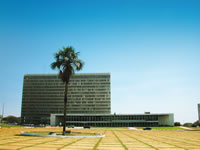Facts
Travel
Hotels
Restaurants
Business
Photos
|
Brasilia peculiarities
 Brasilia Brasilia
 Brasilia Facts Brasilia Facts
What makes Brasilia different from other Brazilian cities?
First off: Brasília is not even a city; Brasilia is one of the Administrative Regions of the Federal District. Read more about the differences between Brasília and the Federal District of Brazil.
The article 32 of Brazilian Constitution establishes some peculiarities of the Federal District:
Article 32. The Federal District, which may not be divided into municipalities, shall be governed by an organic law, voted in two readings, with a minimum interval of ten days, and approved by two-thirds of the Legislative Chamber, which shall enact it, in accordance with the principles set forth in this Constitution.
Paragraph l - The legislative powers reserved to the States and municipalities are attributed to the Federal District.
Paragraph 2 - The election of the Governor and the Vice-Governor, complying with the rules of article 77, and of the District Deputies shall coincide with that of the state Governors and Deputies, for a term of office of the same duration.
Paragraph 3 - The provisions of article 27 apply to the District Deputies and the Legislative Chamber.
Paragraph 4 - A federal law shall provide for the use, by the Government of the Federal District, of the civil and military polices and the military fire brigade.
A few comments:
1) The caput of the article prohibits the Federal District from being divided into municipalities. In all other Brazilian States, provided that some conditions are met (including, among the conditions, the approval of the interested people), new municipalities may be created. The intention of this command is to keep the unicity of the Federal District.

Buriti Palace
Seat of Government
2) The Federal District was given the legislative powers of States AND municipalities; such competences are listed in articles 25 through 31 of the Federal Constitution. One of the consequences is that the Federal District may collect State taxes AND municipal taxes.
3) The Constitution of 1988 gave to the F.D. autonomy to write a District Constitution, elect a Governor and District Deputies; in short, the same as other Brazilian States.
The situation was very different, before 1988. The Federal District had a Governor, but he was appointed directly by the President of Republic (there were no elections). There was not a Legislative House; the Legislative Power was exercized by the Federal Senate.
4) Article 21 of Federal Constitution establishes that the Federal District, like all other States, will have its own Judiciary Power, Public Prosecution and Public Defense systems, which shall be funded by the Union.
5) Article 21 also determines that the Union shall "organize and maintain the civil police, military police and fire brigade of Federal District, as well as give financial assistance to the Federal District for the execution of public services, by means of an specific fund".
Even though the Federal District is allowed to collect more taxes, the lack of industries maintains tax revenues at a low level (compared to the industrial States). However, because of this Federal aid, the quality of the public services in Brasilia rank among the best in Brazil.
Teachers, doctors and police of the District Federal are probably the best paid in Brazil; the police payroll is fully paid by the Federal government; schools and hospitals have budgets supplemented by federal funds.
|
|


